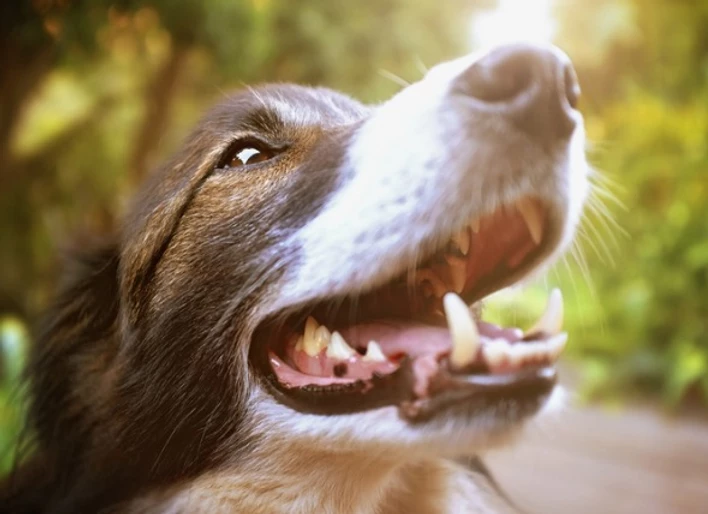5 Reasons Why Dog Dental Care Is Important

How would you feel if you never brushed your teeth? Constantly having lots of plaque and an unpleasant taste in your mouth would probably be more than you could tolerate. Your wallet probably wouldn’t feel so good either after having to pay a hefty dentist bill to get your oral health back in good shape.
Now imagine what could happen to your dog’s mouth without proper dog dental care. The simple answer is: dog dental disease.
Dental diseases in dogs are quite common. By age 3, over 80 percent of dogs have some form of dental disease, also known as periodontal disease. Dog dental disease has serious consequences, so maintaining good dog dental care is very important.
What is dental disease?
Dental disease affects the teeth, gums and structures that support and surround a dog’s teeth. It begins with plaque buildup on the teeth. This plaque contains bacteria and food particles.
Plaque that stays on the teeth hardens into tartar. When tartar is above the gumline, it’s easily visible, and your veterinarian can remove it relatively easily during a professional dental cleaning.
However, looks can be deceiving. A set of pearly whites doesn’t necessarily mean that your dog’s mouth is healthy. Tartar that makes its way below the gumline is the real problem.
Tartar below the gumline causes inflammation and not only damages the structures supporting the teeth but also causes infection. When dental disease reaches this stage, dogs can experience serious dental problems and pain.

Signs of dental disease in dogs include:
-
Broken teeth
-
Loose teeth
-
Bad breath
-
Painful and bleeding mouth
-
Refusal or inability to eat and drink
-
Drooling
Why Dog Dental Care Is Important
As a pet parent, you certainly want your dog to have a healthy mouth. Below are five reasons why good dental care for dogs is so critical to your dog’s overall health:
- Preventing tooth loss. When the structures supporting a dog’s teeth become damaged or infected, the teeth loosen and fall out. Good dog dental care will ensure that those teeth-supporting structures stay healthy and keep the teeth in place.
2. Preventing bad breath(halitosis). If a whiff of your dog’s breath makes your nose hairs curl, it’s time for some good dental care. When your dog has a healthy mouth and healthy dog teeth, bad breath won’t be a problem.
3. Preventing oral pain. Dental disease, especially when it’s severe, can be quite painful for dogs. Keeping your dog’s teeth and gums healthy will help prevent oral pain.
4. Preventing organ damage. Bacteria in the plaque can enter the bloodstream and spread to the heart, kidneys and liver. This spread of bacteria, called bacteremia, can damage organs and make dogs quite sick. Good oral health will help prevent bacteremia and subsequent organ damage.
5. Preventing worsening dental disease. Because so many dogs have dental disease by the time they’re 3 years old, it can be difficult to prevent it from developing in the first place. However, good dog dental care can prevent dental disease from becoming severe and causing problems throughout the body.
How Can I Get Plaque Off My Dog’s Teeth?
Dental care for dogs includes not only annual professional dental cleanings done at a veterinarian’s office but also regular at-home dental care. Here are a few things you can do at home to help maintain healthy dog teeth:
-
Brush your dog’s teeth. Brushing your dog’s teeth a few days a week is a great way to maintain good oral health. Use a safe dog toothpaste like Sentry Petrodex veterinary strength enzymatic dog toothpaste.
-
Give your dog dental treats. Not all dogs like their teeth being brushed. If this is your dog, try some dog dental treats, such as Veggie-Dent dental dog treats or Greenie’s dental dog treats.
-
Provide your dog with dental toys. Some dog toys, such as the Nylabone Durachew dental chew dinosaur dog toy, are designed to clean a dog’s teeth and even freshen breath. These toys are durable, so your dog can chew on it to their heart’s content.
Professional dog teeth cleanings require general anesthesia to allow your veterinarian to clean above and below the gumline and ensure that your dog’s entire mouth is cleaned. So, talk with your veterinarian to figure out the best schedule and options for your dog’s dental care routine.
Although dental disease is common in dogs, proper dog dental care can keep a dog’s mouth as healthy as possible.
Author: Dr. Joanna Pendergrass

